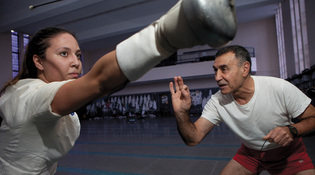 loading
loading
Sporting Life40 years of living by the sword Julie BrownLongtime fencing coach Harry Harutunian instructs épéeist Alexia Cesar ’12. View full image
Upon becoming Yale's head fencing coach in 1970, a vivacious Armenian immigrant named Henry Harutunian revived a sagging program by sheer force of will, personality, and a Soviet-style professionalism not then found on many U.S. fencing strips. He developed a troika of novices into nationally ranked southpaw saberists in three years. He started a women's team in 1974 and guided it to national championships in 1982, 1984, and 1985. Now in his 41st season, Harutunian, 78, has amassed more than 500 wins and generated a fiercely loyal alumni network.
"Fencing was the single most important thing to happen to me at Yale, and Coach is the second most important man in my life," says Steve Blum '74, one of those three fabled lefties and now president of the 600-member Yale Fencing Association. Blum's father, Robert, had fenced in the Olympics in 1964 and 1968, but the son resisted the sport—until Harutunian sought him out in his freshman year. This past Columbus Day weekend, Blum was among more than 150 alums and friends who gathered at Payne Whitney Gymnasium to honor Harutunian's 40th anniversary as head coach. Fellow southpaw David Jacobson '74 was also handpicked that first fall. A high school football player from Fresno, he was wandering the halls of the gym when he peered through one of the fencing salon portholes. Harutunian spotted him. "He literally grabbed me by the arm and pulled me into the fencing room and said, ‘Boy, you be athlete?’" Jacobson was told to report the following day at 3:30 p.m. wearing gym clothes. "It was not, ‘Would you like to try fencing?’ It was, ‘You will.’" (Jacobson's daughter Sada Jacobson '06 followed her father into fencing and won three Olympic medals.) Harutunian believes the skills developed on the strip apply throughout a fencer's life. He abhors complacency. "Try every day to do something," he says. "Whatever time you have in life—do something." He is candid about the end of his life, but empirical evidence suggests it's nowhere in sight. He took up motorcycle riding at 68, remains allergic to vacations, and has developed a post-practice routine of table tennis and salsa music. "I think he's immortal," says Maddie Oliver '13, this year's women's captain. "I'm pretty sure he's never going to die." Succession is an awkward, if inevitable, subject with illustrious coaches, particularly when results slip as they have for Yale in the past decade. But for now, as Harutunian still works 15-hour days and continues to inspire as much as instruct, it is a conversation for another day. When asked about his legacy, he spoke of the Yale fencing endowment and its importance in guaranteeing to future students the joys and lessons of fencing. Then he paused, and added, "And maybe someone remember me—maybe. If not, it's not so important."
The comment period has expired.
|
|